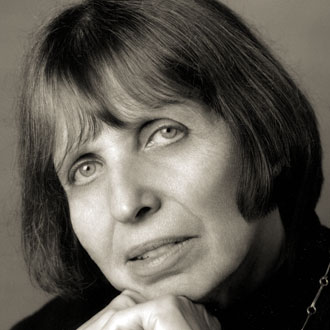One Art
BY PROF. VAROL AKMAN
Linda Pastan (b. 1932)
As I approach my eighties, I am starting to discard whatever is not necessary in my closets, my poems, and my life. In other words, I am determined to Travel Light from now on.
Published in January 2011, "Traveling Light" is the latest collection from a landmark poet long recognized for her "unfailing mastery of her medium" (The New York Times). Linda Pastan was born on May 27, 1932, in New York to Jacob L. and Bess Schwartz Olenik. She received a BA from Radcliffe College (1954) and an MA from Brandeis University (1957). In her senior year at Radcliffe, Pastan won the Mademoiselle poetry prize.
When I was in college in Cambridge, I … heard Dylan Thomas read his poems. … I was totally unprepared for the torrent of language that would pour over me or for the emotional, nearly ecstatic, response I would have to that language. It was partly his words, partly his very voice. But I would never again think of poetry in quite the same way.
About her 1998 volume, "Carnival Evening: New and Selected Poems, 1968-1998," The Boston Globe critic Liz Rosenberg said:
The effect of reading this collection reminded me of only a few other modern poets: Robert Frost, in his virtuosity and beauty, and the great Russian poet Anna Akhmatova, in her passion and straightforward honesty.
Pastan's many awards include the Dylan Thomas award, a Pushcart Prize and the Ruth Lilly Poetry Prize (2003). From 1991 to 1995 she was Poet Laureate of Maryland.
Pastan was on the staff of the Bread Loaf Writers' Conference for 20 years and has taught at American University. Author of more than a dozen books of poetry and essays, her "PM/AM: New and Selected Poems" (1982) and "Carnival Evening" were finalists for the National Book Award. "The Imperfect Paradise" (1988) was a finalist for The Los Angeles Times Book Prize. Her other books include "The Last Uncle" (2001) and "Queen of a Rainy Country" (2006).
It is so easy to fall in love with Pastan's poetry. Maybe that explains why I have chosen two of her poems: the first heartrending and the second amusing. Professor Pastan has also kindly allowed me to use material from a talk she once gave (entitled "Life of a Poet"). It is possible to detect the provenance of the poems in these excerpts.
> It might have been Flaubert who said that a writer must be daring in his work, not in his life. This comforts me as I live my ordinary, housewifely life in woods that are really only a far out suburb of Washington, D.C. (No battlefields or hitchhiking around the world, no carousing and hardly any drinking.) And I am comforted by Emily Dickinson who was even more agoraphobic than I am, by Thoreau who traveled much in Concord.
> Many, though certainly not all, of my poems describe my so called "real life." This real life was hard to come by. A product of the fifties, I had just started to publish my work when, still in college, I married and stopped writing altogether for nearly ten years. Instead I put homemade desserts on the table every night and fought the knowledge that I was supposed to be writing poems. (That one talent that is death to hide, as Milton put it, though I am not trying to compare myself to Milton.) How my husband helped me get back to poetry, how I gradually took over parts of his study until he finally gave up and moved his work to one of the children's empty rooms I don't have time to go into now.
> I think that my real subject has always been the possibility of loss under the surfaces of ordinary life, though l fear that such losses are much nearer the surface today, as I write more specifically of aging and death.
NOTES
- "Why Are Your Poems So Dark?" was published in the August 2003 issue of Poetry magazine. It also appears in "Queen of a Rainy Country." You can hear Pastan reading it at http://www.pbs.org/wgbh /poetryeverywhere/pastan.html.
- "Marks" appears in "The Five Stages of Grief" (1978) and "Carnival Evening." In her 2009 keynote speech to the National Association for Poetry Therapy, Pastan described it as her most popular poem. About "The Five Stages of Grief," May Sarton observed: "Nothing is here for effect. There is no self-pity, but in this new book she has reached down to a deeper layer and is letting the darkness in."
WHY ARE YOUR POEMS SO DARK?
Isn't the moon dark too,
most of the time?
And doesn't the white page
seem unfinished
without the dark stain
of alphabets?
When God demanded light,
he didn't banish darkness.
Instead he invented
ebony and crows
and that small mole
on your left cheekbone.
Or did you mean to ask
"Why are you sad so often?"
Ask the moon.
Ask what it has witnessed.
MARKS
My husband gives me an A
for last night's supper,
an incomplete for my ironing,
a B plus in bed.
My son says I am average,
an average mother, but if
I put my mind to it
I could improve.
My daughter believes
in Pass/Fail and tells me
I pass. Wait 'til they learn
I'm dropping out.